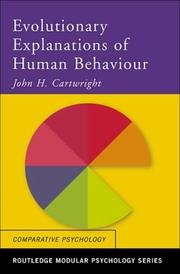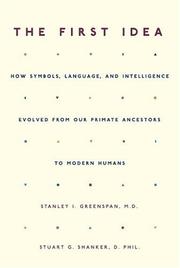| Listing 1 - 10 of 4143 | << page >> |
Sort by
|
Book
ISBN: 146738738X 1467387371 9781467387378 Year: 2016 Publisher: Piscataway, NJ : IEEE,
Abstract | Keywords | Export | Availability | Bookmark
 Loading...
Loading...Choose an application
- Reference Manager
- EndNote
- RefWorks (Direct export to RefWorks)
Annotation Genetic Algorithms Genetic Programming Evolution Strategies Evolutionary Programming Differential Evolution Artificial Immune Systems Particle Swarm Optimization Ant Colony Optimization Bacterial Foraging Artificial Bees Harmony Search Gravitational search algorithm Quantum Computing Memetic Computing Fireflies Algorithm Hybridization of Algorithms Imperialism Competitive Learning Tabu Search Simulated Annealing Bat Algorithm intelligent water drop Other Metaheuristics.
Book
ISBN: 9780199778232 Year: 2011 Publisher: New York : Oxford University Press,
Abstract | Keywords | Export | Availability | Bookmark
 Loading...
Loading...Choose an application
- Reference Manager
- EndNote
- RefWorks (Direct export to RefWorks)
Book
ISBN: 3658039582 Year: 2014 Publisher: Wiesbaden : Springer Fachmedien Wiesbaden : Imprint: Springer Spektrum,
Abstract | Keywords | Export | Availability | Bookmark
 Loading...
Loading...Choose an application
- Reference Manager
- EndNote
- RefWorks (Direct export to RefWorks)
Das Thema ‚Emergenzen in komplexen Systemen‘ wird derzeit viel diskutiert. Mit Emergenzen sind solche Strukturen und Eigenschaften eines Systems gemeint, die sich aus der Kenntnis der Teile des Systems und ihrer Wechselwirkungen nicht verstehen lassen. ‚Leben‘ zum Beispiel ist auch für den Molekularbiologen eine emergente Eigenschaft der Zelle, nicht aber ihrer Moleküle. ‚Bewusstsein‘ gilt nach wie vor als eine emergente Eigenschaft unseres Zentralnervensystems, nicht aber der einzelnen Neuronen. Emergenzen werden in Philosophie, Physik und Biologie unterschiedlich behandelt. Hans Mohr geht es vorrangig um eine zeitgerechte Würdigung der Bedeutung von Emergenzen bei der Erforschung komplexer Systeme in Biologie, Soziobiologie und Ökonomik. Der Inhalt n Begriffliche Klärung – Reduktion/Erklärung, Evolution, Leben/Bewusstsein n Fallstudien in Thesenform – Emergente Komplexität und Evolution, Rituale, Ökosysteme, Emergenzen und Meme n Das Emergenzkonzept in der Soziobiologie Die Zielgruppen n Dozierende und Studierende der Natur- und Technikwissenschaften und der Philosophie n Am Themenkomplex interessierte und vorgebildete Laien Der Autor Hans Mohr ist emeritierter Professor des Instituts für Biologie II der Universität Freiburg i. Br. Heute ist er vorrangig als Autor an der Nahtstelle zwischen Naturwissenschaften und Philosophie tätig.

ISBN: 0415241480 Year: 2001 Publisher: Hove : Routledge,
Abstract | Keywords | Export | Availability | Bookmark
 Loading...
Loading...Choose an application
- Reference Manager
- EndNote
- RefWorks (Direct export to RefWorks)
Book
ISBN: 1781952884 Year: 2003 Publisher: Northhampton, Mass. : Edward Elgar Pub.,
Abstract | Keywords | Export | Availability | Bookmark
 Loading...
Loading...Choose an application
- Reference Manager
- EndNote
- RefWorks (Direct export to RefWorks)
Evolutionary Economic Thought explores the theoretical roots of the evolutionary approach, and in so doing, demonstrates how it fits squarely into the theoretical mainstream. Focusing on the institutions of evolutionary change and the processes - such as competition - that generate change, this book takes account of important European contributions to the discipline, hitherto overshadowed by the American paradigm. As such, the book serves to broaden the current discourse. Whilst evolutionary economics itself is a well-researched and widely documented field, this book will be credited with establishing a history of evolutionary economic thought.

ISBN: 0472104837 9780472104833 Year: 1994 Publisher: Ann Arbor (Mich.) : University of Michigan press,
Abstract | Keywords | Export | Availability | Bookmark
 Loading...
Loading...Choose an application
- Reference Manager
- EndNote
- RefWorks (Direct export to RefWorks)

ISBN: 9780805077698 Year: 2005 Publisher: New York (N.Y.) : Holt,
Abstract | Keywords | Export | Availability | Bookmark
 Loading...
Loading...Choose an application
- Reference Manager
- EndNote
- RefWorks (Direct export to RefWorks)

ISBN: 0738206806 9780738206806 Year: 2004 Publisher: Cambridge (Mass.) Da Capo
Abstract | Keywords | Export | Availability | Bookmark
 Loading...
Loading...Choose an application
- Reference Manager
- EndNote
- RefWorks (Direct export to RefWorks)
In the childhood of every human being, and at the dawn of human history, there is an amazing - and until now unexplained - leap from simple, genetically programmed behavior to symbolic thinking, language, and culture. In The First Idea, Stanley Greenspan and Stuart Shanker explore this missing link and offer new insights into two longstanding questions: how human beings first created symbols and how these abilities initially evolved and were subsequently transmitted and transformed across generations over millions of years." "Drawing on evidence - not only from their research and collaborations comparing the language and intelligence of human infants and apes, but also from the fossil record, neuroscience, and Greenspan's extensive work with children with autism - Greenspan and Shanker offer a radical new direction for evolutionary theory, developmental psychology, and philosophy.

ISBN: 0132937204 Year: 1973 Publisher: Englewood Cliffs Prentice-Hall, Inc.
Abstract | Keywords | Export | Availability | Bookmark
 Loading...
Loading...Choose an application
- Reference Manager
- EndNote
- RefWorks (Direct export to RefWorks)
Book
ISBN: 1509046011 150904602X Year: 2017 Publisher: Piscataway : IEEE,
Abstract | Keywords | Export | Availability | Bookmark
 Loading...
Loading...Choose an application
- Reference Manager
- EndNote
- RefWorks (Direct export to RefWorks)
The conference is about evolutionary computation and all the topic around it.
| Listing 1 - 10 of 4143 | << page >> |
Sort by
|

 Search
Search Feedback
Feedback About UniCat
About UniCat  Help
Help News
News